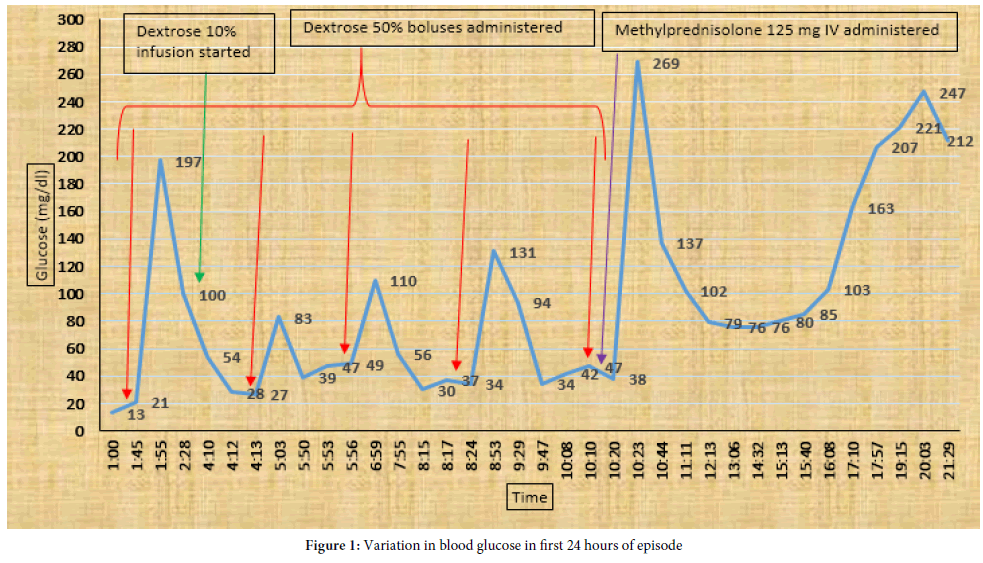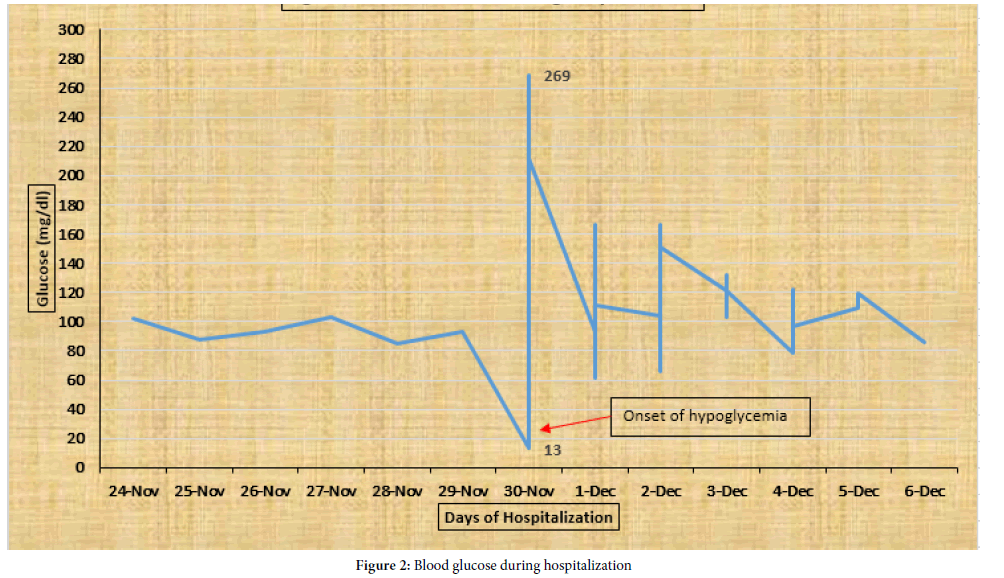Doxycycline Induced Hypoglycemia in an Adult without Diabetes
2 Department of Medicine, University of Connecticut Health Center, 263 Farmington Ave. Farmington, CT 06030-1235, USA
Citation: Ashraf S, Saberinia H, Desimone M. Doxycycline Induced Hypoglycemia in an Adult without Diabetes. J Basic Clin Pharma 2018;9:115-117.
This open-access article is distributed under the terms of the Creative Commons Attribution Non-Commercial License (CC BY-NC) (http://creativecommons.org/licenses/by-nc/4.0/), which permits reuse, distribution and reproduction of the article, provided that the original work is properly cited and the reuse is restricted to noncommercial purposes. For commercial reuse, contact reprints@jbclinpharm.org
Abstract
Hypoglycemia in adults without diabetes is rare and finding the cause can be challenging. We report a case of 91 year old male who developed severe and persistent hypoglycemia after treatment with doxycycline (DOXY). He was admitted with fatigue and weakness after failed outpatient treatment for pneumonia with amoxicillin/clavulanic acid. He was started on DOXY and piperacillin/tazobactam. On day 6 of hospitalization, patient had a change in mental status, shortness of breath, and rapid AF. Serum glucose was 13 mg/dl. He was given boluses of dextrose 50%, and infusion of dextrose 10% started. However, the patient’s blood glucose dropped as low as 30 mg/dl. 72 hours after DOXY and lisinopril were discontinued the patient’s blood glucose returned to normal, and remained stable for the remainder of admission. ACE-I are reported to cause hypoglycemia, however, this was less likely as this patient had been on lisinopril prior to hospitalization and didn’t develop hypoglycemia on restarting it outpatient. Tetracyclines have been described as a cause of hypoglycemia in few case reports. The proposed mechanisms for tetracycline induced hypoglycemia include increase insulin sensitivity, increased half-life of insulin, interference with epinephrine induced hyperglycemia and tetracycline induced hepatotoxicity. Awareness for this potential adverse event should be considered as this medication is commonly prescribed.
Keywords
Doxycycline, hypoglycemia, diabetes
Introduction
Hypoglycemia is a serious medical condition which may result in an inability of the central nervous system to meet its energy needs.[1] If not diagnosed and treated, it can result in permanent neurologic deficits and even death.[2] Hypoglycemia in adults without diabetes is uncommon and finding the cause can be challenging.[3] Certain nondiabetes medications can cause hypoglycemia.[4] The use of tetracyclines including doxycycline (DOXY) has been suggested as a potential cause of hypoglycemia.[5-7] We describe a case of an elderly nondiabetic male who developed severe and persistent hypoglycemia after treatment with DOXY.
Case Presentation
A 90-year-old male with a past medical history of chronic atrial fibrillation and hypertension presented in the emergency department with a 3 week history of fatigue and weakness. He had recently been treated for community acquired pneumonia as an outpatient with amoxicillin/clavulanic acid. Physical examination was unremarkable except for poor hearing and decreased breath sounds at the lung bases. Laboratory examination including complete blood count and complete metabolic panel on the day of admission was normal except for serum sodium of 121. Hyponatremia was thought to be secondary to syndrome of inappropriate release of antidiuretic hormone (SIADH) and improved with only fluid restriction. Chest Computed Tomography (CT) scan on day of admission showed bilateral pleural effusions and a left sided chest tube was placed. He was started on doxycycline 100 mg by mouth twice a day and piperacillin/tazobactam intravenously every six hours for pneumonia on the day of admission. His home medication dabigatran, an oral anticoagulant, was discontinued as he had chest tube placement, however lisinopril 2.5 mg daily was continued.
On day 6 of hospitalization the patient had a change in mental status with lethargy, shortness of breath, and rapid atrial fibrillation. Serum glucose was 13 mg/dL; remaining labs were unremarkable. He was transferred to the intensive care unit and given repeated treatment with 50 cc dextrose 50%, and an infusion of dextrose 10% was started with frequent rate adjustment and hourly glucose monitoring. Despite this, the patient’s blood glucose continued to fluctuate and was as low as 30 mg/dL [Figure 1]. Due to his persistent hypoglycemia the patient was given intravenous methylprednisolone 125 mg; a cortisol level prior to steroid administration was 16.1 μg/dL (10-20 μg/dL). Subsequently his blood glucose increased to 269 mg/dL, but returned to 76 mg/dL two hours later. The patient denied any personal or family history of diabetes and recent insulin administration. Testing showed HbA1c 5.6% and a negative sulfonylurea panel screen. Insulin and C-peptide levels were drawn at the time when serum glucose was 85 mg/dL, and were normal. Abdominal CT ordered by the primary team was normal. 72 hours after doxycycline and lisinopril were discontinued the patient’s blood glucose returned to normal, and remained stable for the remainder of his admission [Figure 2]. He was discharged twelve days later. Home dose of lisinopril was restarted on discharge with no further episodes of hypoglycemia after discharge.
Discussion
Medications are a frequent cause of hypoglycemia especially in the elderly. Hypoglycemia is a well-known adverse effect of antidiabetic agents; however several classes of non-diabetic pharmaceutical agents used in every day clinical practice can also cause severe hypoglycemia.[8] There is only one other case report of doxycycline-induced hypoglycemia in a non-diabetic patient.[5] In our patient, the hypoglycemic event happened after 6 days of DOXY use which is consistent with the other case report in which hypoglycemia occurred one week after the initiation of the DOXY.[6] Angiotensin converting enzyme inhibitors are reported to cause hypoglycemia, however, this is less likely as our patient had been on lisinopril prior to this hospitalization without any adverse effects and no hypoglycemia on restarting it outpatient.[4] The mechanism for hypoglycemia caused by DOXY is unclear. Proposed mechanisms include increased insulin sensitivity, increased half-life of insulin by inhibiting insulin degradation in the liver, interference with epinephrine induced hyperglycemia by inhibiting glycogenolysis, and tetracycline induced hepatotoxicity.[9,10] Awareness for this potential adverse event should be considered as this medication is commonly prescribed, especially in outpatient setting.
REFERENCES
- Guettier JM, Gorden P. Hypoglycemia. Endocrinol Metab Clin North Am 2006;35:753-66.
- Sieber FE, Traystman RJ. Special issues: Glucose and the brain. Crit Care Med 1992;20:104-14.
- Cryer PE, Axelrod L, Grossman AB. Evaluation and management of adult hypoglycemic disorders: An endocrine society clinical practice guideline. J Clin Endocrinol Metab 2009;94:709-28.
- Murad MH, Coto YF, Wang AT. Clinical review: Drug-induced hypoglycemia: A systematic review. J Clin Endocrinol Metab 2009;94:741-5.
- Basaria S, Braga M, Moore WT. Doxycycline-induced hypoglycemia in a nondiabetic young man. South Med J 2002;95:1353-4.
- Odeh M, Oliven A. Doxycycline-induced hypoglycemia. J Clin Pharmacol 2000;40:1173-4.
- Tan CH, Shelley C, Harman KE. Doxycycline-induced hypoglycaemia. Clin Exp Dermatol 2016;41:43-4.
- Seltzer HS. Drug-induced hypoglycemia. A review based on 473 cases. Diabetes 1972;21:955-66.
- Hiatt N, Bonorris G, Coverdale MG. Oxytetracycline and hypoglycemia with convulsions in pancreatectomized dogs. Proc Soc Exp Biol Med 1966;122:489-93.
- Miller JB. Hypoglycaemic effect of oxytetracycline. British Med J 1966;2:1007.



